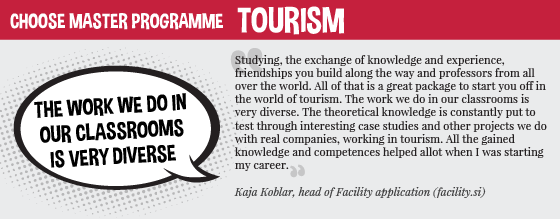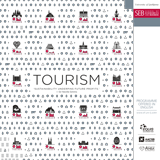Tourism
Tourism is one of the fastest growing activities. Today, the number of journeys reached the number of world population of about seven billion people. Travelling generates one-tenth of the world’s gross domestic product, while the development of tourism also brings social, cultural and environmental benefits. The expansion of tourism offers business opportunities to countries, regions, local communities and entrepreneurs as well as the public and non-governmental sectors. Travelling has become an element of lifestyle and quality of life. In a narrow sense, tourism encompasses work in hotels, bars and restaurants, tourist agencies, airlines, congress offices, entertainment parks, destination organisations, governmental and municipal offices etc. In a broader sense however, tourism also includes other tourism-related work in banks, insurance companies, shops, promotion agencies, the construction industry and traffic sector.
Enrolling in the second-level programme Tourism is the right choice for those who are aware of the business opportunities this industry offers.
| Duration of study | 2 years (4 semesters) |
| Scope of ECTS | 120 ECTS |
| Study status | full-time |
| Degree | Master of Arts (MA) – second cycle graduate in Tourism |

Knowledge and skills acquired by taking this programme
The Tourism programme offers an in-depth understanding of tourist operations, management, marketing, tourist development and its impacts, both theoretically and through practical examples. By studying literature and business examples, through discussions during lectures and seminars, via own individual work and group work you will acquire the knowledge and skills you need for a successful professional career. Within this process, you will be supported by domestic and foreign professors and experts working in the areas of practice, politics and tourism development. You will also acquire special knowledge and skills related to value-based business operations and the requirements of sustainable and responsible development. And you will have the opportunity to study some of the contents abroad.
When you complete the study programme you will be qualified to analyse, synthesise and independently formulate solutions to complex tourism business and development problems facing tourist companies, destinations, public sector organisations and non-governmental ones. The research methods and procedures will help you develop the critical thinking and profile of a global citizen who is aware of the responsibility for a better economic, social and environmental future.
With the basic knowledge gained during Tourism studies at the School of Economics and Business you will also develop the ability to constantly broaden your knowledge and innovatively adjust to new trends. You will know how to seek marketing opportunities, design effective and responsible solutions and perform activities that help put your ideas into practice. You will learn why and how to embed ethical, sustainable and professional principles in your work.
Organisations/institutions/companies with employment prospects
As a graduate of the Tourism master programme you will acquire expert knowledge in business sciences and create employment opportunities in many sectors. You will be technically and professionally qualified to work in companies operating in the tourism market and dealing with tourism planning or policy. You will also be qualified to work in e.g. hotels, agencies, transport companies, promotional companies and those engaged in congress or event management. Moreover, you will be able to work in other companies, e.g. shops, banks, promotion agencies in the private and public sectors or non-governmental organisations.
Professions and jobs
- tourist manager in a company/destination manager/product manager,
- head of outbound tourism for various markets/head of reception tourism for various markets,
- product head – design of tourist products/sales of tourist products/marketing and promotion of tourist products,
- tourism development planner for destination organisations/planner of tourism development and public sector policy,
- tourist analyst/researcher,
- advisor on tourism development/sole proprietor – consultant,
- tourism promoter,
- tourism blogger,
- E-commerce & social media manager in tourism,
- event planner/organiser,
- sustainability/CSR strategist in tourist destination/enterprise,
- expert for digital tourism.
Curriculum
1st year
| Semester | Course | Type | ECTS |
| 1. (winter) | Managerial Economics | 9 | 7 |
| 1. (winter) | Research Methods and Techniques | 9 | 7 |
| 1. (winter) | Tourism Economics | 10 | 7 |
| 1. (winter) | Accounting Information for Decision-Making | 10 | 7 |
| 2. (spring) | Economic Policies of the EU | 9 | 7 |
| 2. (spring) | Sustainomics in Tourism | 10 | 7 |
| 2. (spring) | Tourism Destination Management | 10 | 7 |
| 2. (spring) | ELECTIVE COURSE | 13 | 7 |
| 2. (spring) | Business Skills Development 1 | / | 4 |
2nd year
| Semester | Course | Type | ECTS |
| 3. (winter) | Service Design and Innovations in Tourism | 10 | 7 |
| 3. (winter) | * Research Methods in Tourism | 11 | 7 |
| * Tourism Marketing | 11 | 7 | |
| 3. (winter) | ** Tourism Law | 11 | 7 |
| ** Tourism Policy | 11 | 7 | |
| 3. (winter) | MASTER’S THESIS PROPOSAL | / | 7 |
| 4. (spring) | ELECTIVE COURSE | 13 | 7 |
| 4. (spring) | Business Skills Development 2 | / | 4 |
| 4. (spring) | MASTER'S THESIS | / | 21 |








